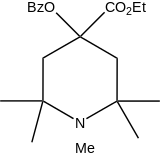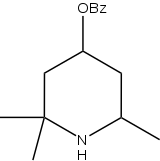Eucaine
Eucaine is a chemical that was previously used as a local anaesthetic as an analogue of cocaine. It is a white, crystalline solid.
It can have two forms, alpha-eucaine, or beta-Eucaine (betacain).[1][2] The brand name Betacaine can sometimes refer to a preparation containing lignocaine, not eucaine.
Prior to World War one Britain imported beta-Eucaine from Germany.[3] During the war a team including Jocelyn Field Thorpe and Martha Annie Whiteley managed to develop a synthesis in Britain.[3]
Gallery
Eucaine

Alpha-eucaine

Beta-eucaine
Chemical Structures
References
- ↑ R. H. F. Manske (12 May 2014). The Alkaloids: Chemistry and Physiology. Elsevier. pp. 213–4. ISBN 978-1-4832-2192-2.
- ↑ Walter Sneader (31 October 2005). Drug Discovery: A History. John Wiley & Sons. pp. 127–9. ISBN 978-0-470-01552-0.
- 1 2 Creese, Mary RS (1997). "Martha Annie Whiteley (1866-1956): Chemist and Editor" (PDF). Bulletin for the History of Chemistry. 8: 42–45.
External links
| Look up eucaine in Wiktionary, the free dictionary. |
This article is issued from
Wikipedia.
The text is licensed under Creative Commons - Attribution - Sharealike.
Additional terms may apply for the media files.